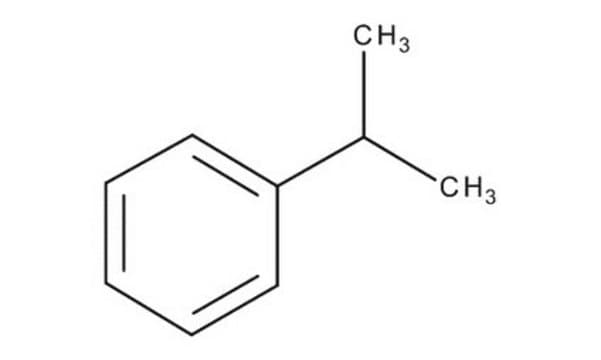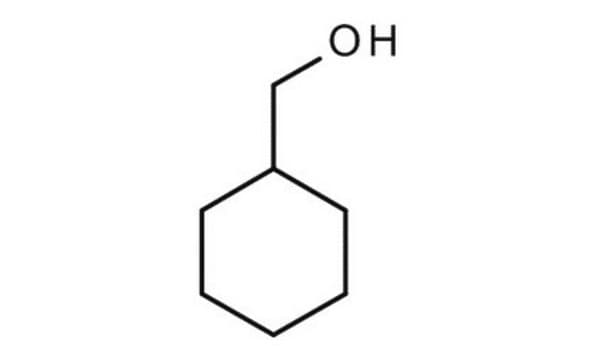8.01372
Ethylbenzene
for synthesis
Synonym(s):
Ethylbenzene
About This Item
Recommended Products
vapor pressure
9.5 hPa ( 20 °C)
Quality Level
Assay
≥99.0% (GC)
form
liquid
autoignition temp.
430 °C
potency
3500 mg/kg LD50, oral (Rat)
15354 mg/kg LD50, skin (Rabbit)
expl. lim.
1.0-7.8 % (v/v)
kinematic viscosity
0.63 cSt(40 °C)
bp
136 °C/1013 hPa
mp
-95 °C
transition temp
flash point 15 °C
solubility
0.2 g/L
density
0.87 g/cm3 at 20 °C
storage temp.
2-30°C
InChI
1S/C8H10/c1-2-8-6-4-3-5-7-8/h3-7H,2H2,1H3
InChI key
YNQLUTRBYVCPMQ-UHFFFAOYSA-N
Related Categories
Application
- Gate-opening Induced by C8 Aromatics in a Double Diamondoid Coordination Network.: This study highlights the unique structural transformations in a double diamondoid coordination network triggered by the adsorption of ethylbenzene and other C8 aromatics, showcasing its potential for molecular sieving and sensor applications (Zaworotko et al., 2024).
- Correlations between blood volatile hydrocarbon concentrations in different types of fire-related deaths.: This research examines the levels of ethylbenzene and other volatile hydrocarbons in the blood of individuals who have died in fires, exploring correlations with exposure levels and fire characteristics (Nishitani et al., 2023).
- VOC data-driven evaluation of vehicle cabin odor: from ANN to CNN-BiLSTM.: This paper introduces a novel approach using artificial neural networks and convolutional BiLSTM for analyzing VOCs like ethylbenzene in vehicle cabins, providing insights into the impacts on air quality and odor perception (Du et al., 2024).
- Exposure and health risk assessment of volatile organic compounds among drivers and passengers in long-distance buses.: Analyzes the exposure to ethylbenzene and other VOCs inside long-distance buses, assessing the associated health risks for both drivers and passengers (Chang et al., 2024).
- Exhaled Volatile Organic Compounds for Asthma Control Classification in Children with Moderate to Severe Asthma: Results from the SysPharmPediA Study.: This study investigates the use of exhaled ethylbenzene levels as biomarkers for classifying asthma control in children, offering a non-invasive method to monitor and manage the condition (Maitland-van der Zee et al., 2024).
Analysis Note
Density (d 20 °C/ 4 °C): 0.866 - 0.867
Identity (IR): passes test
Signal Word
Danger
Hazard Statements
Precautionary Statements
Hazard Classifications
Acute Tox. 4 Inhalation - Aquatic Chronic 3 - Asp. Tox. 1 - Flam. Liq. 2 - STOT RE 2
Target Organs
hearing organs
Storage Class Code
3 - Flammable liquids
WGK
WGK 1
Flash Point(F)
71.6 °F - closed cup
Flash Point(C)
22.0 °C - closed cup
Certificates of Analysis (COA)
Search for Certificates of Analysis (COA) by entering the products Lot/Batch Number. Lot and Batch Numbers can be found on a product’s label following the words ‘Lot’ or ‘Batch’.
Already Own This Product?
Find documentation for the products that you have recently purchased in the Document Library.
Customers Also Viewed
Our team of scientists has experience in all areas of research including Life Science, Material Science, Chemical Synthesis, Chromatography, Analytical and many others.
Contact Technical Service

















